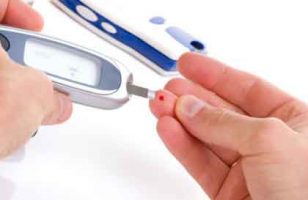- Home
- Editorial
- News
- Practice Guidelines
- Anesthesiology Guidelines
- Cancer Guidelines
- Cardiac Sciences Guidelines
- Critical Care Guidelines
- Dentistry Guidelines
- Dermatology Guidelines
- Diabetes and Endo Guidelines
- Diagnostics Guidelines
- ENT Guidelines
- Featured Practice Guidelines
- Gastroenterology Guidelines
- Geriatrics Guidelines
- Medicine Guidelines
- Nephrology Guidelines
- Neurosciences Guidelines
- Obs and Gynae Guidelines
- Ophthalmology Guidelines
- Orthopaedics Guidelines
- Paediatrics Guidelines
- Psychiatry Guidelines
- Pulmonology Guidelines
- Radiology Guidelines
- Surgery Guidelines
- Urology Guidelines
Finger-stick blood test may not help type 2 diabetes treatment: JAMA Internal Medicine

Chapel Hill, NC - In a landmark study, UNC School of Medicine researchers have shown that blood glucose testing does not offer a significant advantage in blood sugar control or quality of life for type 2 diabetes patients who are not treated with insulin. The paper, published in JAMA Internal Medicine, details findings from a randomized trial called "The MONITOR Trial." This study is the first large pragmatic study examining glucose monitoring in the United States.
Type 2 diabetes is an epidemic afflicting one in 11 people in the United States. For those treated with insulin, checking blood sugar with a finger stick at home is an accepted practice for monitoring the effects of insulin therapy. However, the majority of type 2 diabetes patients are not treated with insulin. These patients, too, are often recommended glucose monitoring, despite an ongoing debate about its effectiveness in controlling diabetes or improving how patients feel.
"Our study results have the potential to transform current clinical practice for patients and their providers by placing a spotlight on the perennial question, 'to test or not to test?'" said Katrina Donahue, MD, MPH, senior author of the study and Professor and Director of Research at UNC Family Medicine.
During the study, 450 patients were assigned to one of three groups: no blood sugar monitoring, once daily glucose monitoring, or enhanced once-daily glucose monitoring with an internet-delivered tailored message of encouragement or instruction.
The trial lasted one year. By the end:
- There were no significant differences in blood glucose control across the three groups.
- There were no significant differences found in health-related quality of life.
- There were no notable differences in hypoglycemia (low blood sugar), hospitalizations, emergency room visits. Between programs, there was also no difference in the number of individuals who had to start using insulin treatment to better control blood sugar levels.
"Of course, patients and providers have to consider each unique situation as they determine whether home blood glucose monitoring is appropriate," Donahue said. "But the study's null results suggest that self-monitoring of blood glucose in non-insulin treated type 2 diabetes has limited utility. For the majority, the costs may outweigh the benefits."
Today in the U.S., most of the 25 million people with type 2 diabetes do not take insulin. They control their blood sugar with exercise, diet, and sometimes medications such as metformin. Currently, 75 percent of these patients also perform regular blood glucose testing at home, generally at the recommendation of a provider.
Proponents of blood glucose testing argue that daily testing promotes better awareness of glucose levels, leading to improvements in diet and lifestyle. In the past, a number of smaller clinical trials have shown mixed results in attempting to verify this. Several studies suggested a benefit for testing, while others found no evidence of benefit, or found that testing could even be harmful. Daily testing imposes not only a financial cost, but can also take a mental toll, increasing the rate of depression or anxiety in some patients.
"There was no difference between either type of testing," said UNC endocrinologist Laura Young, MD, PhD, the paper's first author. "Enhanced Self-Monitoring Blood Glucose, in the pragmatic setting of regular daily life, offered no additional health benefits."
"There has been a lack of consensus, not just in the United States, but worldwide," added Young. "The lack of standard guidelines makes it all the more difficult for patients, who are already struggling to manage a chronic condition. And at the end of the day, patients have to make a choice."
Patients living with diabetes should discuss the need for blood sugar monitoring with their health care providers. If together a patient and their provider decide that blood sugar monitoring is not necessary, patients could be spared hundreds of finger sticks and save hundreds of dollars every year, at least until insulin treatment is required.

Disclaimer: This site is primarily intended for healthcare professionals. Any content/information on this website does not replace the advice of medical and/or health professionals and should not be construed as medical/diagnostic advice/endorsement or prescription. Use of this site is subject to our terms of use, privacy policy, advertisement policy. © 2020 Minerva Medical Treatment Pvt Ltd